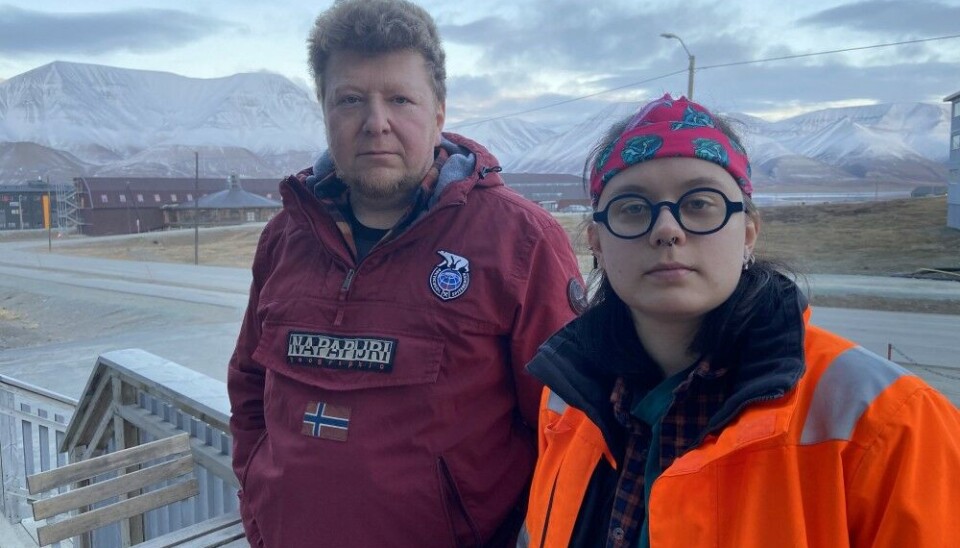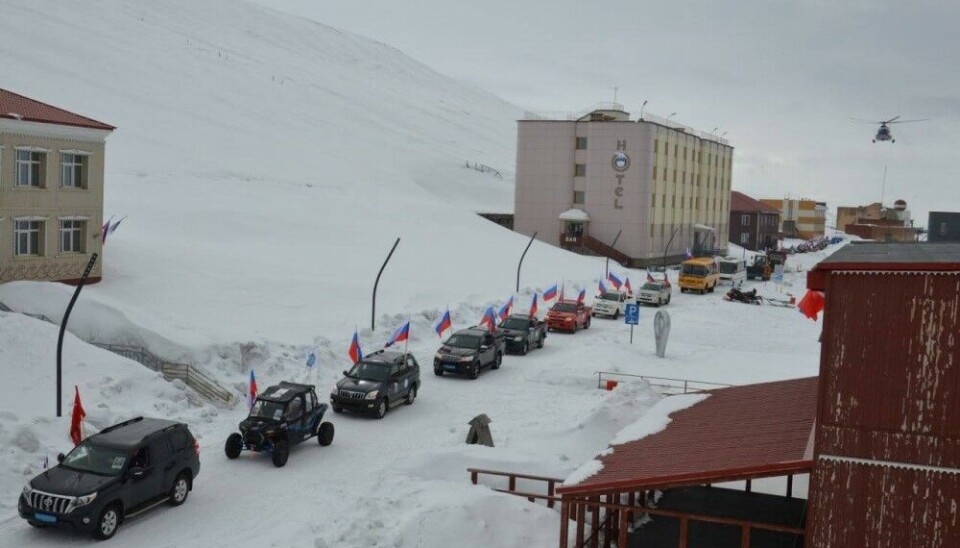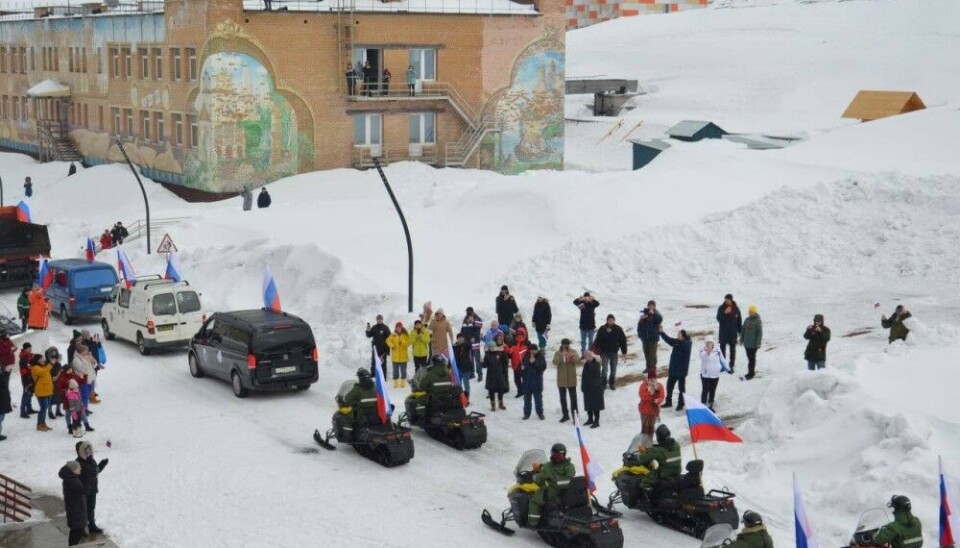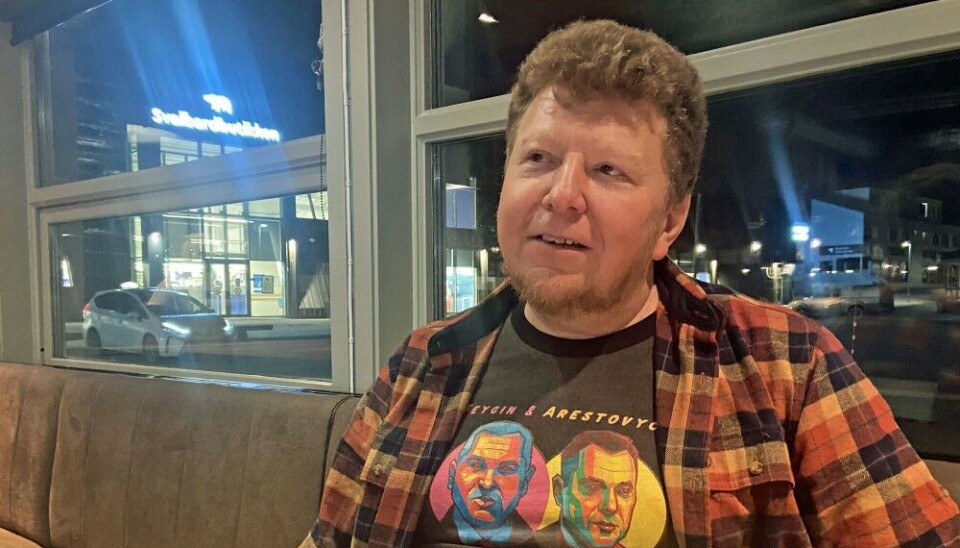
Barentsburg: "Everyone was told to stop posting opinions about the war"
"It was clearly said, either you work and don't speak out, or you'll be fired," tells Timofey Rogozhin, former head of the tourist arm of Russia's state-owned Aktikugol company at Svalbard.
The “not-talk, not-discuss” message came in early March 2022, shortly after Russia’s all-out war on Ukraine. Messenger was Russia’s top official and former head of Arktikugol.
Timofey Rogozhin has left the mining settlement of Barentsburg where he was in charge of developing Arctic tourism as a new income for Moscow’s presence in the Norwegian archipelago.
Today, he is shocked to see how his former employer, Trust Arktikugol, together with the Russian Consulate General, on May 9 staged a military-style propaganda parade in Barentsburg. On Norwegian territory.
“There were no parades on Victory Day in Barentsburg,” Rogozhin tells. He lived in the town for eight years and left after strong disagreements with Moscow on Russia’s political direction.
“Usually on May 7 or 8 there was a performance or a concert, there was an official meeting at the Consulate General, with Norwegian guests,” the ex-tourism chief explains. He adds that sometimes a flower laying ceremony took place at Cape Heer where an artillery gun from a Norwegian ship is placed in commemoration of the fights taking place during World War II.
Under the 1920 Svalbard Treaty, Norway has full and absolute sovereignty over the archipelago. Citizens from signatory countries, like Russia, have equal rights of abode as Norwegians. For Moscow, that is key to maintaining its presence in the old mining community on the strategically important archipelago between the shallow Barents Sea and the deeper Norwegian Sea and Greenland Sea.
Timofey Rogozhin also recalls that former Consul General, Sergey Gushchin, began to practice the Immortal Regiment actions a few years ago. “Usually it gathered no more than 20-30 people,” Rogozhin says.
Last year everything changed in Barentsburg. Moscow appointed both a new Consul General and a new CEO of the Trust Arktikugol, the company that in practice runs everything in Barentsburg.
For outsiders, the military-style parade this week was a real eye-opener.

“Is Norway developing a “little green men” problem on Svalbard,” asks Ph.D. Fellow Karen-Anna Eggen at the Norwegian Institute for Defence Studies.
“As security policy issues become more prominent in the Arctic region, maintaining low tensions might be less tempting for Russia as it looses leverage gained through cooperation in other spheres, Eggen notes in a tweet.
The parade in Barentsburg came two days before Norway took over the chair of the Arctic Council on May 11. From Russia. A country that the seven other Arctic nations, for war reasons, don’t want to have around the table anymore when polar affairs are discussed.
Timofey Rogozhin is very critical of Aktikugol’s behavior at Svalbard. Especially after the brutal attack on Ukraine.
“Everyone was clearly and sternly told to stop writing any of their opinions about the war on social networks, regardless of views,” Rogozhin recalls from early March 2022. He says the message was not to be misunderstood: “Either you work and don’t speak out, or you’ll be fired.”
Answer, but no answer
Replying to questions from the Barents Observer about the accusations, Arktikugol writes in an email that “Everything that we want to share is put to our social media.”
The social media platforms of the company, on Vkontakte and Telegram, however, have no texts near any of the asked questions. The company has neither answered about possible similar military-style “victory day” parades to be arranged in Barentsburg in the years to come.
Previously, Barentsburg had a mix of Ukrainians and Russians working side-by-side in the town, the mine and tourism arm.
“Almost all citizens of Ukraine have left,” Rogozhin says. “They began to leave in the first days of the war. and throughout 2022. According to my estimate, at least 50 people left. Maybe more.”
Valeria Mikhailskaya is one of them. The Ukrainian woman left Barentsburg for Longyearbyen where she today works in tourism. She confirms what Timofey Rogozin tells about the situation in the Russian settlement which is located some 40 kilometers from Longyearbyen.
“Ongoing madness”
Rogozhin says the so-called “victory parade” was a clear display of the ongoing madness.
The parade through the main street of Barentsburg consisted of 50 cars, snowmobiles, trucks, busses, a low-flying MI8 helicopter, and lined-up people with Russian and Soviet memorial flags. Most interesting, the ten first snowmobile drivers were dressed up in dark-green military-looking winter uniforms that looked like they were used for the first time and shipped north for this special occasion.

“The past year has turned a civilized modern village with an open and friendly society into some kind of grey closed and aggressive swamp. If you look at social networks [in Barentsburg], you can clearly see a systematic desire to return to the Soviet system and totalitarianism,” Timofey Rogozhin states.
Totalitarian direction
“This is indicative of the direction Russia is taking more generally in a totalitarian direction,” says Karen-Anna Eggen to the Barents Observer.
She is not surprised about Arktikugol ordering its employees to stay silent. However, “it clearly goes against the freedom of expression that applies on Norwegian soil,” Eggen makes clear.
Lack of war criticism, or any second opinions about the Moscow regime is obvious, on the English Facebook site and the Russian. Same with the Russian language Vkontakte.
Norway and Russia have fairly similar articles in the constitution guaranteeing freedom of speech. Paragraph 100 in the Norwegian Constitution says “There shall be freedom of expression.” The Russian text in Paragraph 29(1) says “Everyone shall be guaranteed the freedom of ideas and speech.”
At Russia’s northernmost settlement, people are forced into silence, Rogozhin believes.

He is convinced the May 9 parade arranged by the new leaders in Barentsburg had one task: to demonstrate the strength of Russia. “Not soft power, but the power of propaganda.”
“This clearly reflects the overall actions of today’s Russian government.”
The Governor of Svalbard, Lars Fause, says to the Barents Observer he was invited to take part in the commemoration, but declined the invitation because of the war in Ukraine. Via social media, the Governor later saw the parade and says diplomatically: “The marking appears larger and with a different expression than before.”
Fause, though, underlines “There is freedom of assembly in Norway.”
The Foreign Ministry in Oslo weighs the words carefully when commenting on the Russian parade.
“In today’s situation, commemorations of Victory Day have taken on a different content as a result of Russia’s war against Ukraine, which violates international law. It is understandable that this arouses negative reactions,” says the ministry’s spokesperson Ragnhild Simenstad to the Barents Observer.















